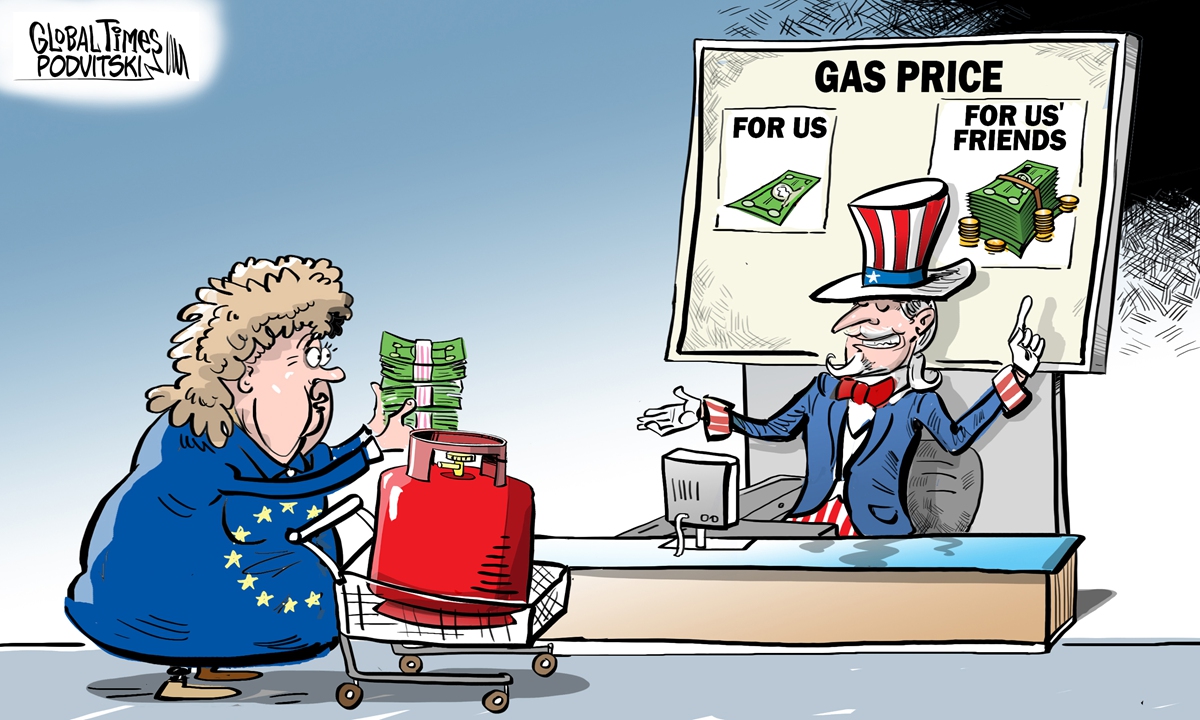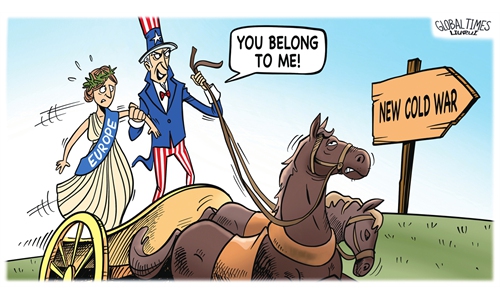Scholz defies ‘decoupling’ in fresh sign of Europe’s nuanced shift on China policy

Illustration: Vitaly Podvitski/Russia
As the bloc's dancing to the US' tune has boomeranged on itself, a rethink of its alliance with the self-centered US, simultaneously with a nuanced shift in its China policy, is well in the making, global affairs observers said.
An engulfing energy crisis and recession woes confronting Europe, which has mired itself in sanctions against Russia, have prompted calls for a return to pragmatism when it comes to its China strategy, observers stressed, and they said China's unwavering opening-up has set the country as a global growth enabler despite worldwide gloominess.
Still, fundamental shifts in European diplomacy would be contingent upon more actions that could translate the rhetorical tweaks into truly rationality-based policies, experts reckoned.
Nuanced shift
Addressing the 13th German Mechanical Engineering Summit held in Berlin on Tuesday, Scholz reiterated the importance of globalization and opposed decoupling from countries including China, Chinese state broadcaster CGTN reported on Wednesday.
Also at the engineering conference on Tuesday, EU trade commissioner Valdis Dombrovskis said that decoupling from China is not an option for EU businesses, according to Reuters.
The German Chamber of Commerce in China did not respond to a Global Times request for comment as of the press time.
"We commend these remarks from the European leaders," Chinese Foreign Ministry spokesperson Mao Ning said in response to a question raised by the Global Times during a routine media briefing on Wednesday.
"China also supports globalization and opposes decoupling. With the world economy in the doldrums, to stay open and engaged in cooperation and grow economic and trade ties is good not only for China and Europe, but also for the world economic recovery," Mao stated.
Experts said that although there are some anti-globalization voices, globalization is still in the fundamental interests of Europe, as it has brought a better division of labor and layout of the international market. Globalization is especially crucial for Germany, whose resources and exports are highly dependent on external markets.
In a sign of bilateral trade closeness, China-EU trade topped $800 billion for the first time in 2021 and two-way investment went beyond $270 billion in cumulative terms.
In the first eight months of 2022, bilateral trade hit $575.22 billion, up by 8.8 percent from the year before. The EU's investment in China soared 121.5 percent year-on-year to $7.45 billion, official data showed.
Apparently, the EU has awakened to the fallout of its teaming-up with the US. As a US ally who has joined Washington in sanctioning Russia on energy security grounds, Europe has found itself bruised by the other face of the US - disregarding the energy plight of Europe and subjecting the continent to unreasonably costly energy supplies from the US, Zhang Hong, an Eastern European studies expert with the Chinese Academy of Social Sciences (CASS), told the Global Times on Wednesday.
European countries have come to realize that entirely following in the US' footsteps could barely ensure their own interests, Zhang said, pointing to a shift in European diplomacy under way that revolves around redefining its policies toward China and the US.
The US could benefit from the Russia-Ukraine conflict and the resulting energy crisis to the detriment of European interests, warned French Economy and Finance Minister Bruno Le Maire on Monday.
The US' offering of its liquefied natural gas to Europe comes at "four times" the price at which it sells to American suppliers, according to Le Maire.
As Dombrovskis put it, "the EU should continue engaging with China with pragmatism and without naivety." The EU's relations with the US, its other important trading partner, have also changed, he said.
The EU trade commissioner argued that the green subsidies provided for in the US Inflation Reduction Act "discriminate against the EU's automotive, renewables, battery and energy-intensive industries," per the Reuters report.
"While they say 'no more naivety' toward China and Russia, they are also implying no more naivety to US manipulation," Cui Hongjian, director of the Department of European Studies at the China Institute of International Studies, told the Global Times on Wednesday.
Pragmatism in Europe's best interest
With the grim reality fueling a strategic rethink, Europe is shown to be increasingly in favor of a pragmatic mentality as major EU economies including Germany and France are navigating through the global gloominess, observers said, urging more sincerity and affirmative actions on the part of Europe to forge closer ties with China.
"China insists on opening up, and is actively promoting the development of globalization. We will not close the door, much less use economic and trade means as a weapon against others as the West fears," Cui said.
Therefore, there is no reason for Europe to regard China as the subject of a so-called move away from reliance or decoupling, experts said, echoing the official call for closer China-Europe relations.
"China-Europe cooperation is deeply rooted in solid public support, extensive common interests and similar strategic needs. Such cooperation enjoys great resilience and potential," spokesperson Mao said.
China is ready to work with Europe to jointly work for greater progress in bilateral cooperation in various areas and deliver more benefits to the two peoples, the spokesperson went on to say.
Some commentators have said that Scholz's remarks may indicate a shift of the wind in Germany's or even Europe's diplomacy. However, Chinese experts remained cautious, and they said Europe is rather divided on the issue. Some politicians are still keen to get rid of China out of partisan and personal considerations, while others uphold a more rational, pragmatic and comprehensive view. The most important thing is to see what will eventually be implemented into policies and actions, experts stressed.


